Five Days to a Better You
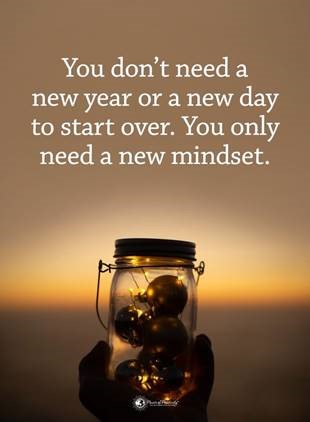
A new year can bring many things to our lives such as hopes, wishes, plans and the infamous “resolutions” to create a better year than the one before. All well and good of course, but how long can these last if we are doing exactly as we did before? If we take old fears, beliefs, actions and habits from one year into the next, then we will likely get more of the same.
Better You week is about becoming more self-aware in key areas that impact upon your mental and physical health and using this awareness to take steps to address any negative issues. Self-awareness and understanding are the most important factors in living better and making helpful choices. Making a conscious choice to think things through with a new approach and to do more helpful things to both self and others (even small actions count) will make the positive difference you seek.
Day 1: Who we are
We humans are complex creatures for sure but while the “whole is greater than the sum of its parts” it is helpful to break down what is happening for us in any given situation, to understand ourselves better thus enabling us to bring forward changes to problem areas that then benefit the whole.
We respond to situations (trivial, important and everything in between) in our lives with automatic thinking. Thoughts create feelings, often the most memorable part of any experience and the part we remember most. Accompanying these are physical sensations of the body that occur naturally, to prepare us for some form of action (in an anxious situation we are prepared for fight, flight or freeze). This action part is our behaviour – what we do – in the situation. This is the part that can be noticed by others and has a direct effect on those around us. All these parts coexist and occur in us all (brain-body connection) and all parts impact and reinforce the other. Great with positive experiences – no change needed! Not so good if the experience is negative – something’s gotta give!

Action:
Remember that we all experience thoughts, feelings, physical sensations and behave in some way or another in response to these and it is easy to get trapped into a negative thinking-behaviour pattern. Get to know yourself using the model as a guide.
- What was I thinking?
- How did I feel?
- What was going on in my body?
- What did I do?
- Was this helpful/unhelpful?
NB:
- Can I see this in a different way/what would be a more realistic and helpful thought?
- What could I do that would be more helpful/change the outcome?
Day 2: Thoughts
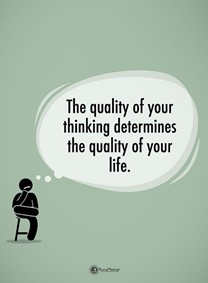
Our thoughts are constantly helping us to interpret the world around us, describing what is happening, and trying to make sense of it by helping us interpret events, sights, sounds, smells, feelings. Without even realising it, we add our own meaning to everything happening around us and make decisions based on this. Lots of things influence the interpretations we make, our previous experiences, our upbringing, our culture, religious beliefs and family values so it is no wonder that we can have a different experience to someone else in the exact same situation.
“We don’t see things as they are, we see things as we are” (Anais Nin)
Negative thoughts are the Usain Bolt of thoughts – they cross the finish line first! We should be grateful for this; they are part of a finely tuned process connected to the fight/flight survival system that has kept us alive. We are the ones who have changed the context. Our modern-day lifestyles (work and home) provide ample opportunities for this system to fire on all cylinders even when it is not (in theory) needed.
Your inner voice is the one that you will hear most in your life. Make it kind so being in your own headspace is a nice place to be! This can be done with a bit of practice. Time to break old negative mental habits!
Cognitive shifting is the conscious choice to take charge of your own mental habit and to redirect your focus in a more helpful direction. For example, many situations/things happen that can make us feel annoyed. How you direct your thoughts has an impact on whether you stay annoyed, perhaps acting in an aggressive way to others, or are able to let that annoyance go and respond flexibly and effectively. If you dwell on the negatives you also miss the positives.
Action:
Challenge negative thoughts:
- Is this thought a fact?
- What meaning am I giving this situation and why this?
- What evidence is there that this is true?
- Is there another way of looking at it?
- What would I say to a friend in this situation?
- What is a more balanced/helpful way of looking at it?
Day 3: Emotions
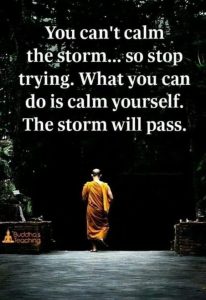
Emotions are what gives life’s tapestry its colour. Whenever we experience something and are describing it back to others, we say things like “I felt so happy, I felt scared, I felt awful” etc. We experience a wide range of emotions arising from many sources such as interacting with those around us, the “big life” events and the ongoing daily hassles. They do not just happen out of the blue. Our emotions are a way of describing our experience to us. They have something to tell us about a situation or event that is in in our life. Behind each, there are thoughts causing them in the first place resulting in body sensations and then behaviours, each emotion having its own chemical footprint in the body and thus different effects. We all like to feel good rather than bad so it makes sense that we do anything to achieve good feelings and avoid bad, which can lead to avoidance or self-medication (e.g., drugs, alcohol, food) to mask negative feelings. Understanding ourselves better can help us to accept and tolerate negative feelings, choose more productive ways of handling them and build instead more positive ones in our lives. No one has all the answers, and we all need to work through things.
Action:
When you experience difficult moments and times leading to feelings that are hard to handle:
- Remember, this is all part of what everyone experiences, remind yourself it won’t last, you can get through this
- Think about what is behind the emotion and why it has arisen
- Problem solve where possible, bring actions that will help
- Don’t be too hard on yourself
- Take time out by doing something nice that you enjoy or distracting yourself from the situation
- Do things that help on an ongoing and regular basis – this will help keep you more balanced and less reactive to stressors
Day 4: Physical Impact
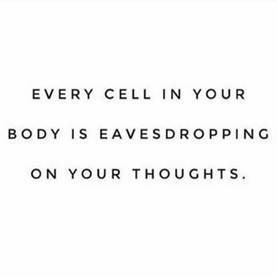
Here’s a word for you – psychoendoneuroimmunology! This field of study has shown that the mind (brain) and body (nervous, hormonal and immune systems) are intricately linked and have a direct impact on our health and wellbeing. In his book of the same title, Dr Bessel van der Kolk says that “the body keeps the score”. Our brain, mind and body are not separate from each other and when we experience trauma the body registers all that is going on inside the head. In her book, “It’s All in Your Head”, Dr Suzanne O’Sullivan talks about “psychosomatic disorders” highlighting that everyone responds physically to psychological distress and that what’s going on in our heads (e.g. from stressors) impacts on the body in all sorts of ways ranging from headaches and digestive upsets to incontinence and paralysis. What’s going on here? Our minds and bodies are in constant union and communication. The mind-body link is there for our good (and how good it is when we have the balance right!) but in cases where the interaction/impact is destructive, we have somehow upset the balance between the two. We are very well designed to cope with short-lived stressors. Longer term is another matter. Time to focus on developing things that bring positive interactions and impact.
Action: healthy habits
Again, it all comes down to our thinking and doing. It is time to do things, including thinking differently, that are good for the mind and time to do things that are good for the body. Both benefit individually and as a whole and our life experience will begin to improve. Recap actions from Days 2 and 3. Start by doing one thing that benefits your mind/body and you will see a difference.
- Build regular exercise into your life, try something you enjoy, sometimes you may not feel like it but remind yourself that you will feel better afterwards
- Ensure you get adequate sleep, if you have trouble sleeping, seek advice about how to promote better sleep – there are lots of things you can do
- Eat and drink in a healthy, balanced way
- Avoid unhealthy habits such as excessive alcohol, smoking and drugs – some people feel these things help manage stress and mood but they actually negatively affect the mind and body
- Building healthy habits takes perseverance, so don’t give up and before you know it these will be natural for you
Day 5: Putting it All Together
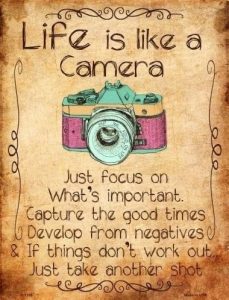
This week has been about enhancing self-awareness and understanding. In this part of the world, we talk about how someone “gets on”. Getting to know and understand how you get on, what is behind this, what your thoughts and feelings are and what’s going on in your body, are how you can begin to identify any difficulties or problem areas and build in changes to find a better, more productive way to get on. You can only try your best and this is good enough!
Action:
- Start small – doing one thing makes a difference
- Being a little kinder and more compassionate with yourself is important
- Do not beat yourself (and/or others!) up about things that do not go as planned
- Stop thinking that everyone else has it sorted and you somehow are way behind where you should be
- We are all a work in progress and the process is the fun part and where life happens!

No comments yet.